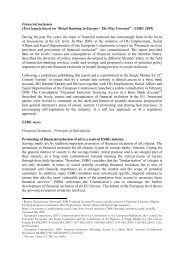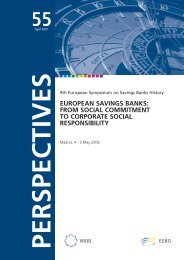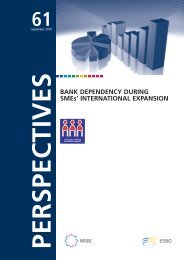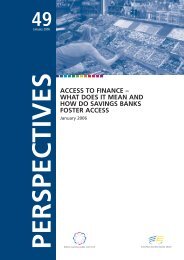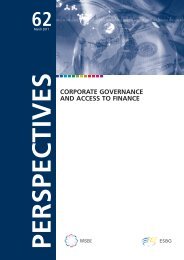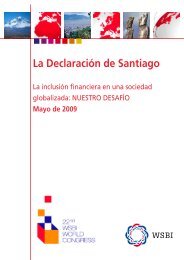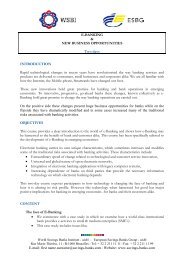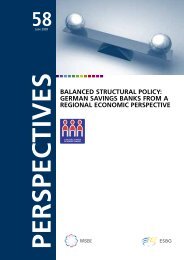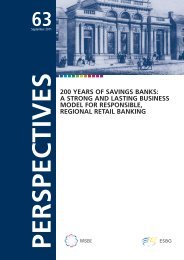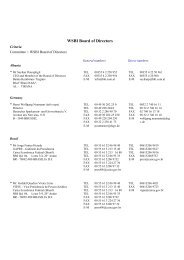A comparative analysis of the US and EU retail banking markets - Wsbi
A comparative analysis of the US and EU retail banking markets - Wsbi
A comparative analysis of the US and EU retail banking markets - Wsbi
Create successful ePaper yourself
Turn your PDF publications into a flip-book with our unique Google optimized e-Paper software.
Ano<strong>the</strong>r important factor in <strong>the</strong> choice between a<br />
state charter <strong>and</strong> a federal charter are <strong>the</strong> chartering<br />
costs. Currently, national banks are charged higher<br />
assessment costs annually than are state banks in<br />
most states. In fact, some states, such as Georgia 159 ,<br />
charge less than half <strong>of</strong> what a comparably sized<br />
national bank or thrift would pay <strong>the</strong> OCC or <strong>the</strong><br />
OTS respectively. O<strong>the</strong>rs charge slightly more than<br />
half <strong>of</strong> <strong>the</strong> amount charged by <strong>the</strong> corresponding<br />
federal agencies, such as <strong>the</strong> State <strong>of</strong> Louisiana 160 .<br />
More generally, many states promote state chartering<br />
<strong>of</strong> banks <strong>and</strong> try to attract credit institutions by<br />
highlighting <strong>the</strong> difference between <strong>the</strong> fees assessed<br />
by <strong>the</strong>ir Banking Department <strong>and</strong> those charged by<br />
<strong>the</strong> federal supervisors (OCC or <strong>the</strong> OTS) 161 .<br />
Worthy <strong>of</strong> note on <strong>the</strong> subject is <strong>the</strong> view that has<br />
been expressed by some in <strong>the</strong> <strong>US</strong> that state banks<br />
actually benefit from “federal subsidies”.<br />
This view stems from <strong>the</strong> fact that apart from being<br />
supervised at <strong>the</strong> state level, state-chartered banks<br />
also have a primary federal supervisor, as stated<br />
above (which is <strong>the</strong> Federal Reserve in <strong>the</strong> case <strong>of</strong><br />
state member banks <strong>and</strong> <strong>the</strong> FDIC in <strong>the</strong> case <strong>of</strong><br />
state non member banks), yet <strong>the</strong>se federal agencies<br />
do not receive specific funding to perform <strong>the</strong>se<br />
supervisory duties. The FDIC for example funds its<br />
own operations on <strong>the</strong> basis <strong>of</strong> premiums <strong>and</strong><br />
earnings from <strong>the</strong> deposit insurance fund, paid both<br />
by federally-chartered <strong>and</strong> state-chartered institutions.<br />
Given that an important part <strong>of</strong> this funding goes<br />
towards <strong>the</strong> supervision <strong>of</strong> state-chartered banks,<br />
some would argue that federally-chartered banks<br />
effectively pay for part <strong>of</strong> <strong>the</strong> supervision <strong>of</strong> statechartered<br />
banks 162 . The same argument goes for <strong>the</strong><br />
funding <strong>of</strong> <strong>the</strong> supervisory operations <strong>of</strong> <strong>the</strong> Federal<br />
Reserve with regard to Member State-chartered banks.<br />
This view is however not shared by all. America’s<br />
Community Bankers (ACB) 163 for example are <strong>of</strong> <strong>the</strong><br />
opinion that “state banks should not have to pay <strong>the</strong><br />
cost <strong>of</strong> <strong>the</strong>ir FDIC examinations”, as “<strong>the</strong> FDIC should<br />
not be required to subsidise <strong>the</strong> operating costs <strong>of</strong><br />
<strong>the</strong> OCC or <strong>of</strong> <strong>the</strong> OTS”. The ACB indicates that<br />
examination fees will “increase costs <strong>and</strong> encourage<br />
unnecessary or duplicative examinations”. In addition,<br />
<strong>the</strong>y point out that “<strong>the</strong> new fees will reduce funds<br />
available for lending to local communities <strong>and</strong> will tilt<br />
<strong>the</strong> dual state/federal system <strong>of</strong> bank regulation<br />
fur<strong>the</strong>r toward federal domination by increasing <strong>the</strong><br />
relative appeal <strong>of</strong> a national bank charter” 164 .<br />
O<strong>the</strong>r factors which are <strong>of</strong>ten considered when<br />
choosing a charter concern dividends, o<strong>the</strong>r fees<br />
(o<strong>the</strong>r than <strong>the</strong> already mentioned chartering<br />
assessments) <strong>and</strong> lending limits for state-chartered<br />
banks, for <strong>the</strong> following reasons:<br />
- Generally, it is observed that state laws governing<br />
<strong>the</strong> payment <strong>of</strong> dividends are less restrictive than <strong>the</strong><br />
provisions on dividends relating to national banks 165 .<br />
- Similarly, <strong>the</strong> legal lending limit for a national<br />
bank is in general stricter than for a state bank.<br />
Currently, <strong>the</strong> OCC rules permit national banks to<br />
make loans to a single borrower up to an amount<br />
equivalent to 15% <strong>of</strong> <strong>the</strong>ir unimpaired capital <strong>and</strong><br />
surplus 166 . National banks may extend that credit<br />
by ano<strong>the</strong>r 10% <strong>of</strong> capital <strong>and</strong> surplus to <strong>the</strong><br />
same borrower if <strong>the</strong> amount <strong>of</strong> <strong>the</strong> loan that<br />
exceeds 15% is secured by “readily marketable<br />
collateral”. On <strong>the</strong> o<strong>the</strong>r h<strong>and</strong>, <strong>the</strong> lending limits<br />
for state-chartered banks vary substantially from<br />
one state to <strong>the</strong> o<strong>the</strong>r, with differences in terms<br />
<strong>of</strong> lending limit, <strong>of</strong> <strong>the</strong> definition <strong>of</strong> a single<br />
borrower, <strong>and</strong> <strong>of</strong> exceptions for fully collateralised<br />
loans. In several states, state-chartered banks are<br />
entitled to a legal lending limit <strong>of</strong> 25% <strong>of</strong> <strong>the</strong>ir<br />
capital. In Kansas, for example, <strong>the</strong> lending limit<br />
mounts up to 25% <strong>and</strong> 35% in <strong>the</strong> case <strong>of</strong> loans<br />
secured by real estate 167 .<br />
159 Information concerning <strong>the</strong> department <strong>of</strong> <strong>banking</strong> <strong>and</strong> finance <strong>of</strong> <strong>the</strong> State <strong>of</strong> Georgia, available at: http://www.ganet.org/dbf/chartering_a_bank.html.<br />
160 According to <strong>the</strong> Louisiana Office <strong>of</strong> Financial Institutions (http://www.<strong>of</strong>i.state.la.us), OFI charges $25,000 for an assessment <strong>of</strong> a bank or a thrift with<br />
average assets <strong>of</strong> $100 million, compared to $44,700 charged by <strong>the</strong> OCC <strong>and</strong> $33,870 charged by <strong>the</strong> OTS respectively.<br />
161 Examples <strong>of</strong> this include <strong>the</strong> States <strong>of</strong> Arkansas, Tennessee, Florida, Texas <strong>and</strong> Missouri in <strong>the</strong> following respective websites: (http://www.accessarkansas.org/<br />
bank/benefits_advantages.html), (http://tennessee.gov/financialinst/charter.html), (http://www.fldfs.com/<strong>of</strong>r/<strong>banking</strong>/state_charter.htm), (http://www.<strong>banking</strong>.state.tx.us/<br />
CORP/CHARTER/benefits.htm#Lower%20Costs), (http://www.missouri-finance.org).<br />
162 Mr. John D. Hawke, Jr., Comptroller <strong>of</strong> <strong>the</strong> Currency argued that <strong>the</strong> fact that 52% <strong>of</strong> <strong>the</strong> premiums paid to rebuild <strong>the</strong> Bank Insurance Fund originate from<br />
national banks implies that 52% <strong>of</strong> <strong>the</strong> costs for supervising non Member State-chartered banks at <strong>the</strong> federal level is paid by national banks. This, whereas<br />
<strong>the</strong> supervisor <strong>of</strong> national banks (OCC) is funded entirely by <strong>the</strong> assessments paid by <strong>the</strong> national banks. See J.D. Hawke Jr., “Deposit Insurance Reform <strong>and</strong><br />
<strong>the</strong> Cost <strong>of</strong> Bank Supervision”, Exchequer Club Washington DC, 20/12/2000.<br />
163 America's Community Bankers represents <strong>the</strong> nation's community banks <strong>of</strong> all charter types <strong>and</strong> sizes.<br />
164 America’s Community Bankers, 2005 Policy Positions, page 71.<br />
165 The restrictions on a national bank's ability to pay dividends arise principally from two National Bank Act sources: 12 U.S.C. § 60 <strong>and</strong> 12 U.S.C. § 56. Those<br />
acts place a recent earnings limitation on <strong>the</strong> payment <strong>of</strong> dividends by a national bank by requiring prior OCC approval <strong>of</strong> a dividend if <strong>the</strong> total <strong>of</strong> all dividends<br />
declared by a national bank in any year exceeds <strong>the</strong> total <strong>of</strong> its "net pr<strong>of</strong>its" <strong>of</strong> that year combined with net pr<strong>of</strong>its <strong>of</strong> <strong>the</strong> two preceding years, less any<br />
required transfer to surplus. The OCC fur<strong>the</strong>r restricts <strong>the</strong> ability <strong>of</strong> national banks to pay dividends on common stock by preventing national banks from<br />
including provisions for loan losses in "net pr<strong>of</strong>its," <strong>and</strong> thus, in <strong>the</strong> funds available for payment <strong>of</strong> dividends.<br />
166 12 CFR (Code <strong>of</strong> Federal Regulations) Part 32.<br />
167 http://www.osbckansas.org/About<strong>the</strong>OSBC/advantge.html.<br />
55



